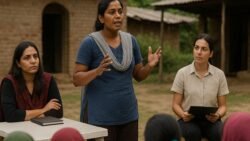Prioritizes Community Development – At a time when social equity and community empowerment are more critical than ever, joining a movement dedicated to community development and advocacy offers individuals and organizations a chance to create meaningful change. Initiatives that focus on empowering local populations, improving access to essential services, and fostering sustainable livelihoods have demonstrated measurable impact across various regions. By participating in such programs, volunteers and stakeholders gain first-hand experience in grassroots mobilization, policy engagement, and social innovation. According to United Nations – Social Development Initiatives, community-driven efforts are among the most effective ways to address inequalities and enhance social cohesion. At platforms like Zenys, participants can collaborate on projects targeting education, health, and economic inclusion, ensuring that development strategies are inclusive, equitable, and impactful. Being part of this movement allows individuals to influence policy, champion marginalized voices, and contribute to sustainable community transformation, making advocacy and development an actionable and rewarding pursuit.

Strengthening Communities Through Grassroots Initiatives
One of the core pillars of this movement is the implementation of grassroots initiatives that address local needs. These programs focus on empowering residents to take ownership of development projects in their neighborhoods, fostering a sense of community responsibility and sustainability. Activities include establishing community centers, organizing educational workshops, providing vocational training, and supporting local entrepreneurs. Research from World Bank – Community-Driven Development highlights that locally-driven interventions lead to higher participation rates, increased accountability, and long-term resilience. By engaging directly with community members, organizations can better understand the challenges faced by vulnerable populations and tailor solutions that are culturally relevant and context-specific. Grassroots programs also serve as a training ground for emerging leaders, offering them practical experience in project management, conflict resolution, and advocacy. Participants develop skills that not only benefit their communities but also prepare them to take on larger roles in civic engagement and social governance.
Advocacy That Amplifies Local Voices
Effective community development is intrinsically linked to advocacy that amplifies the concerns and aspirations of marginalized populations. Through targeted campaigns, policy dialogues, and public awareness initiatives, advocacy ensures that the voices of those often overlooked in decision-making processes are heard and considered. According to CIVICUS – Advocacy and Civic Engagement, advocacy empowers communities by influencing policies, promoting social justice, and driving systemic change. Platforms such as Zenys facilitate structured advocacy programs where volunteers, activists, and local leaders collaborate to address pressing issues such as access to quality education, healthcare, and legal protection. These efforts create accountability among authorities, encourage transparency, and strengthen democratic processes. Advocacy initiatives also foster networks of like-minded individuals and organizations, enhancing the impact and sustainability of community-driven development projects. By combining advocacy with practical development actions, this movement ensures that local communities are not only beneficiaries but also active participants in shaping their futures.
Education and Capacity Building as Key Drivers
Education and capacity building form a critical component of community development strategies. Initiatives that provide training, mentorship, and skill-building opportunities equip community members with the tools they need to thrive economically and socially. According to UNESCO – Community Education Programs, targeted education programs contribute to social mobility, improve employment prospects, and empower individuals to engage more effectively in civic life. Programs facilitated through platforms like Zenys focus on both formal and informal learning, ranging from literacy campaigns and vocational training to workshops on financial management, health awareness, and leadership development. By strengthening the human capital within communities, these programs promote self-reliance, enhance problem-solving capabilities, and create a foundation for sustainable development. Participants also gain confidence in advocating for their needs, contributing to a more active and engaged citizenry that can drive positive change at multiple levels.
Collaborative Partnerships and Long-Term Impact
Long-term success in community development relies heavily on collaborative partnerships between local organizations, government agencies, and international bodies. Joint initiatives enable the pooling of resources, expertise, and best practices, ensuring that programs are scalable, sustainable, and impactful. According to UNDP – Partnerships for Sustainable Development, multi-stakeholder collaboration enhances program effectiveness and facilitates knowledge transfer across sectors. Platforms like Zenys actively engage in such partnerships to implement projects in education, healthcare, and social welfare. Collaborative models also encourage accountability and transparency, while offering opportunities for innovation through shared learning. By participating in these partnerships, individuals and organizations contribute to systemic change, address structural inequities, and ensure that community development initiatives are resilient and adaptable. This holistic approach maximizes both the reach and the long-term impact of advocacy and development efforts, making participants an integral part of a movement that transforms communities sustainably and equitably.







